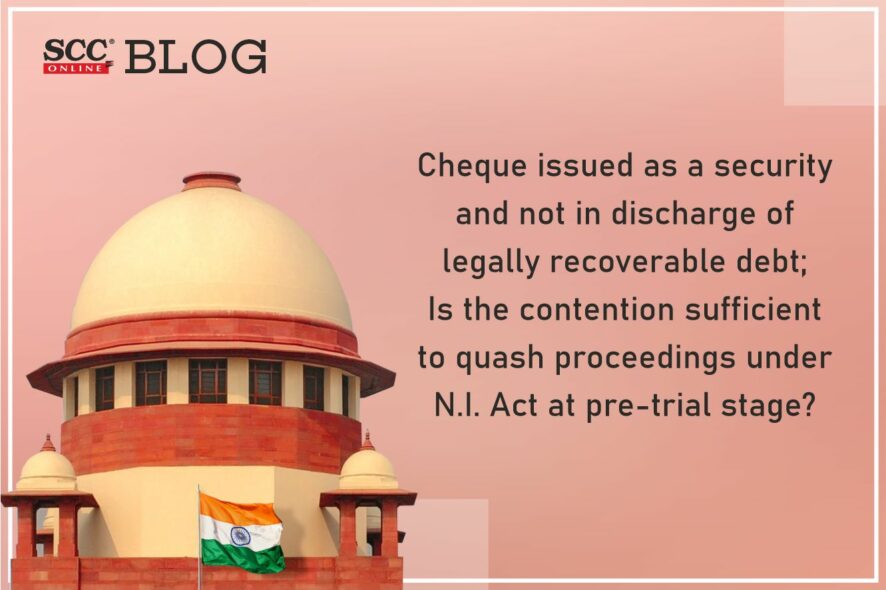Supreme Court: While rejecting an appeal to quash proceedings under Section 138 of the N.I. Act, 1881 at pre-trial stage, the Division Bench comprising of K.M. Joseph and Hrishikesh Roy*, JJ., held that when there is legal presumption, it would not be judicious for the quashing Court to carry out a detailed enquiry on the facts alleged, without first permitting the trial Court to evaluate the evidence of the parties.
The Bench upheld the impugned judgment of Delhi High Court wherein the High Court had – while acting as a quashing court under Section 482 of CrPC – refused to quash proceedings at pre-trial stage. The Bench observed,
“The quashing Court should not take upon itself, the burden of separating the wheat from the chaff where facts are contested.”
Factual Backdrop
Evidently, the complainant invested a substantial sum in the appellant’s company, however as some dispute arose between them, the parties decided that the invested money would be returned to the complainant and the shares allotted to the complainant will be proportionately transferred to the appellant. Pursuant to such compromise, the four cheques were issued by the appellant, which on being presented by the complainant, got dishonourned due to insufficient fund. Consequently, proceedings under NI Act came in picture.
Submissions of the Parties
The appellant argued that without satisfying the essential ingredients for the offence under Section 138 of the N.I. Act to the effect that the dishonoured cheque received by the complainant was against “legally enforceable debt or liability”, the criminal process could not have been issued. According to the appellant, the cheques in question were issued as “security” for buyback of shares and not in discharge of any “legally recoverable debt” and therefore they could not have been prematurely presented to the bank and should have been presented for encashment only after transfer of the complainant’s shareholding in the appellant’s company.
On the contrary, the complainant contended that when the cheques were issued and the signatures thereon were admitted, the presumption of a legally enforceable debt would arise in favour of the holder of the cheque. The complainant argued that the appellant should first pay and then as per the usual practice in the trade, the shares would be transferred to the appellant in due course within the time permitted by law.
Analysis and Conclusion
In HMT Watches Ltd. v. M.A. Abida, (2015) 11 SCC 776, and in Rajiv Thapar v. Madan Lal Kapoor, (2013) 3 SCC 330, it has been held that unless the Court is fully satisfied that the material produced would irrefutably rule out the charges and such materials being of sterling and impeccable quality, the invocation of Section 482 Cr.P.C power to quash the criminal proceedings, would be unmerited.
The Bench opined that when there is legal presumption, it would not be judicious for the quashing Court to carry out a detailed enquiry on the facts alleged, without first permitting the trial Court to evaluate the evidence of the parties. The quashing Court should not take upon itself, the burden of separating the wheat from the chaff where facts are contested. The Bench observed,
“The consequences of scuttling the criminal process at a pre-trial stage can be grave and irreparable.”
The Bench stated that at any rate, whenever facts are disputed the truth should be allowed to emerge by weighing the evidence. Otherwise, the accused may get an un-merited advantage in the criminal process. Hence, the Bench held that when the cheque and the signature were not disputed by the appellant, the balance of convenience was in favour of the complainant/prosecution and the accused will have due opportunity to adduce defence evidence during the trial, to rebut the presumption.
In the light of above, the Bench reached to following findings:
- In shares transactions, there is a time lag between money going out from the buyer and shares reaching to the seller.
- The burden of proving that there is no existing debt or liability, is to be discharged in the trial.
- The legal presumption of the cheque having been issued in the discharge of liability must also receive due weightage.
- In a situation where the accused moves Court for quashing even before trial has commenced, the Court’s approach should be careful enough to not to prematurely extinguish the case by disregarding the legal presumption which supports the complaint.
Consequently, the Bench held that when the proceedings are at a nascent stage, scuttling of the criminal process is not merited. Hence, the impugned judgment was upheld as the same was found to be rendered by applying the correct legal principles.
[Rathish Babu Unnikrishnan v. State (NCT of Delhi), 2022 SCC OnLine SC 513, decided on 26-04-2022]
*Judgment by: Justice Hrishikesh Roy
Appearance by:
For the Appellant: Krishnamohan K., Advocate
For the Complainant: K.M. Nataraj, ASG and Rebecca M. John Senior Counsel
Kamini Sharma, Editorial Assistant has put this report together






